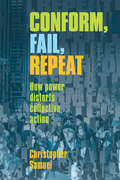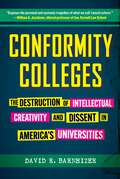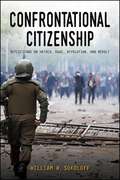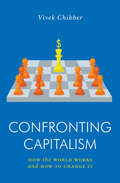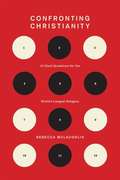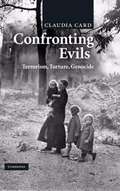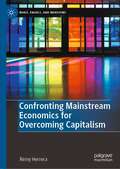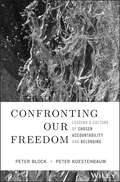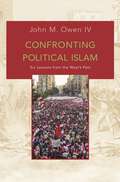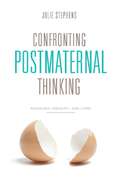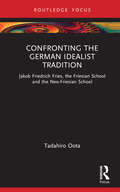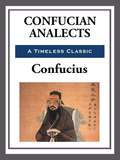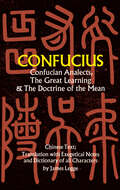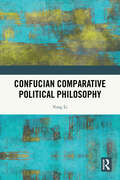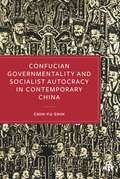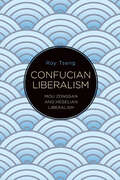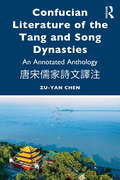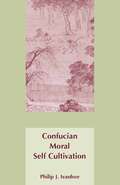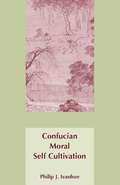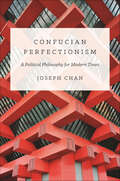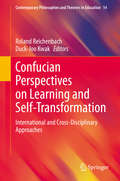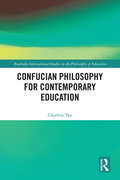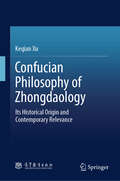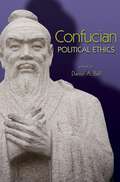- Table View
- List View
Conform, Fail, Repeat: How Power Distorts Collective Action
by Christopher SamuelAnti-globalization activists have done little to slow capitalism’s global march. Many of the gains made by decades of identity-based movements have been limited to privileged subgroups. The lesson of these movements is clear: struggle for change is essential, but the direction of change matters considerably. Like movements of the past, current social movements such as Black Lives Matter, Idle No More, and the growing anti-Trump movement, must navigate a path between reformism and radicalism, pragmatism and idealism, capture and independence. In Conform, Fail, Repeat, Christopher Samuel uses Pierre Bourdieu’s central “thinking tools” to show how power and domination force movements into a no-win choice between conformity and failure. With special attention to North American LGBTQ politics and the G20 protests in Toronto, Conform, Fail, Repeat shows how Bourdieu’s work can give movement observers as well as participants new tools for tracking and avoiding the pitfalls of conformity and failure.
Conformity Colleges: The Destruction of Intellectual Creativity and Dissent in America's Universities
by David R. BarnhizerThe United States' education system, especially its universities, is under attack by the ideological Left, dominated by advocates of Wokeism and Critical Race Theory. Marshall McLuhan was a brilliant thinker best known for his insight that &“the medium is the message." Universities, as well as our entire educational &“medium&” including the K-12 system that feeds its graduates into the university and societal systems, are powerful and overarching mechanisms that we use to shape our understanding. For Western nations, the ideal of the university and of education generally has been to provide us with analytical skills, knowledge, and the ability to create and nurture a healthy society that benefits as many people as possible. That ideal, and the university as educational and social &“medium,&” is under severe attack. The power to use the university as an overarching &“medium&” that offers a strong sense of legitimacy to even flawed and overstated arguments and assertions is why the institution is a target of an ideological Left that is now dominated by advocates of Wokeism and Critical Race Theory. Once obtaining a strong power base in university disciplines and administrations, the revolutionaries of race, gender, and other radical interests metamorphosed from heroic moral beacons fighting and railing against injustice, and revealed themselves as ideological dictators. The truth is that what we now refer to as the Woke/Critical Race Theory activist movement—particularly that controlled by those who came to power in the past thirty years or so—were not simply seeking to expand the nature and content of the university curriculum, or even what is taught in the K-12 system. Their intent was and is to &“destabilize,&” &“transform,&” and supplant what is taught. They seek to create a culture that elevates their interests while aggressively repressing anything they see as an obstacle to power, including healthy discourse and debate. The activists of the Woke/Critical Race Theory Movement are not an honest intellectual movement. They are intense and aggressive political strategists, self-styled &“revolutionaries&” seeking to use our educational systems with the framed narrative of Diversity, Equity, and Inclusion (DEI) that is actually one of "Division, Enmity, and Intimidation/Indoctrination," all the while claiming their interests are benign and aimed at healing. In reality, they are fracturing our fundamental social order, sowing discord, and deliberately suppressing the freedom of speech and thought essential to the well-being of our democratic republic. Conformity Colleges: The Destruction of Intellectual Creativity and Dissent in America&’s Universities will help you understand what is happening and come to grips with the need to challenge, counter, and reverse this &“revolution." Nothing of significance can be done to stop what is going on unless the DEI administrative bureaucracy that now controls universities is dismantled or substantially weakened.
Confounding Powers
by William J. BrennerNearly a decade and a half after 9/11, the study of international politics has yet to address some of the most pressing issues raised by the attacks, most notably the relationships between Al Qaeda's international systemic origins and its international societal effects. This theoretically broad-ranging and empirically far-reaching study addresses that question and others, advancing the study of international politics into new historical settings while providing insights into pressing policy challenges. Looking at actors that depart from established structural and behavioral patterns provides opportunities to examine how those deviations help generate the norms and identities that constitute international society. Systematic examination of the Assassins, Mongols, and Barbary powers provides historical comparison and context to our contemporary struggle, while enriching and deepening our understanding of the systemic forces behind, and societal effects of, these confounding powers.
Confrontational Citizenship: Reflections on Hatred, Rage, Revolution, and Revolt (SUNY series in New Political Science)
by William W. SokoloffA growing number of people are enraged about the quality and direction of public life, despise politicians, and are desperate for real political change. How can the contemporary neoliberal global political order be challenged and rebuilt in an egalitarian and humanitarian manner? What type of political agency and new political institutions are needed for this? In order to answer these questions, Confrontational Citizenship draws on a broad base of perspectives to articulate the concept of confrontational citizenship. William W. Sokoloff defends extra-institutional and confrontational modes of political activity along with new ways of conceiving political institutions as a way to create political orders accountable to the people. In contrast to many forms of democratic theory, Sokoloff argues that confrontational modes of citizenship (e.g., protest) are good because they increase the accountability of a regime to the people, increase the legitimacy of regimes, lead to improvements in a political order, and serve as a means to vent frustration. The goal is to make the word citizen relevant and dangerous to the settled and closed practices that structure our political world and to provide a hopeful vision of what it means to be politically progressive today.
Confronting Capitalism: How the World Works and How to Change It
by Vivek ChibberA strategic guide to building a more democratic and egalitarian futureWhy is our society so unequal? Why, despite their small numbers, do the rich dominate policy and politics even in democratic countries? Why is it so difficult for working people to organize around common interests? How do we begin to build a more equal and democratic society? Vivek Chibber provides a clear and accessible map of how capitalism works, how it limits the power of working and oppressed people, and how to overcome those limits. The capitalist economy generates incredible wealth but also injustice. Those who own the factories, hotels, and farms always have an advantage over the people who rely on that ownership class for their livelihoods. This inequality in power and income is reflected in the operation of the state, where capitalists are able to exert their will even under relatively democratic conditions. The most important reason is that states depend on the employment and profits from capitalist enterprise for both finances and legitimacy. Every meaningful victory for working people has been won through collective struggle but collective action is very difficult to coordinate. In the final section of the book, Chibber walks the reader through some of the historical attempts to build socialism and presents a vision of how we might, perhaps against the odds, build a socialist future.
Confronting Christianity: 12 Hard Questions for the World's Largest Religion
by Rebecca McLaughlinAddressing 12 controversial issues about Christianity--the Bible's teaching on gender and sexuality, the reality of heaven and hell, and more--this book shows how current psychological and scientific research actually aligns with teaching from the Bible.
Confronting Evils: Terrorism, Torture, Genocide
by Claudia CardIn this new contribution to philosophical ethics, Claudia Card revisits the theory of evil developed in her earlier book The Atrocity Paradigm (2002), and expands it to consider collectively perpetrated and collectively suffered atrocities. Redefining evil as a secular concept and focusing on the inexcusability - rather than the culpability - of atrocities, Card examines the tension between responding to evils and preserving humanitarian values. This stimulating and often provocative book contends that understanding the evils in terrorism, torture and genocide enables us to recognise similar evils in everyday life: daily life under oppressive regimes and in racist environments; violence against women, including in the home; violence and executions in prisons; hate crimes; and violence against animals. Card analyses torture, terrorism and genocide in the light of recent atrocities, considering whether there can be moral justifications for terrorism and torture, and providing conceptual tools to distinguish genocide from non-genocidal mass slaughter.
Confronting Mainstream Economics for Overcoming Capitalism (Marx, Engels, and Marxisms)
by Rémy HerreraThis book provides analytical arguments that demonstrate the necessity to go beyond not only mainstream economics but also, and especially, the capitalist economy itself. It provides a radical critique of mainstream economics, comparing it to an unscientific form of single thought, and applies this criticism to the specific fields of growth, development, the institutions, defense, or the environment. It targets both neoclassical economics and reformist “soft heterodox” currents, from neoinstitutionalists to neo-Keynesians—including Thomas Piketty or Amartya Sen, among others. In doing so, it rejects Keynes’ theories of money, the crisis, and the state. It then offers a Marxist interpretation of the current crisis of capitalism, considering it as a systemic crisis without solutions internal to its own logic and dynamics, and emphasizes the links between this capitalist crisis and imperialist wars, and the destruction of the environment and natural resources by capital. The book concludes by arguing that we must find the necessary theoretical and practical alternatives in a Marxist perspective, advocating for socialist transitions away from the capitalist economy to protect humanity and the environment.
Confronting Our Freedom: Leading a Culture of Chosen Accountability and Belonging
by Peter Block Peter KoestenbaumExplore the nature of modern leadership In Confronting Our Freedom, a team of dedicated leadership coaches delivers an exciting and engaging new take on management and leadership. Drawing on recent events in the market and in the world, including the Great Resignation, the COVID-19 pandemic, and widespread digital transformation, the authors invite you to reimagine ideas of freedom and accountability in the context of work. You’ll explore how freedom of action—for managers and employees—is what gives rise to true accountability, both in the community and in the workplace. In the book, you’ll also find: Discussions of the power and structure of freedom, including its implications for our own choices and lives Ways to shift the focus of your leadership and management to accountability and freedom Strategies for shifting the illusion of clear roles and expectations to one compatible with fully human organizationsA groundbreaking and incisive approach to managing and leading others in virtual, hybrid, and in-person settings, Confronting Our Freedom will be an eye opener for managers, executives, and other business leaders seeking to improve their ability to inspire others to their fullest potential.
Confronting Political Islam: Six Lessons from the West's Past
by John M. OwenHow the conflicts of Western history shed light on current upheavals in the Middle EastPolitical Islam has often been compared to ideological movements of the past such as fascism or Christian theocracy. But are such analogies valid? How should the Western world today respond to the challenges of political Islam? Taking an original approach to answer this question, Confronting Political Islam compares Islamism's struggle with secularism to other prolonged ideological clashes in Western history. By examining the past conflicts that have torn Europe and the Americas—and how they have been supported by underground networks, fomented radicalism and revolution, and triggered foreign interventions and international conflicts—John Owen draws six major lessons to demonstrate that much of what we think about political Islam is wrong.Owen focuses on the origins and dynamics of twentieth-century struggles among Communism, Fascism, and liberal democracy; the late eighteenth- and nineteenth-century contests between monarchism and republicanism; and the sixteenth- and seventeenth-century wars of religion between Catholics, Lutherans, Calvinists, and others. Owen then applies principles learned from the successes and mistakes of governments during these conflicts to the contemporary debates embroiling the Middle East. He concludes that ideological struggles last longer than most people presume; ideologies are not monolithic; foreign interventions are the norm; a state may be both rational and ideological; an ideology wins when states that exemplify it outperform other states across a range of measures; and the ideology that wins may be a surprise.Looking at the history of the Western world itself and the fraught questions over how societies should be ordered, Confronting Political Islam upends some of the conventional wisdom about the current upheavals in the Muslim world.
Confronting Postmaternal Thinking: Feminism, Memory, and Care
by Julie StephensThere is a deep cultural anxiety around public expressions of maternalism and the application of maternal values to society as a whole. Julie Stephens examines why postmaternal thinking has become so influential in recent decades and why there has been a growing unease with maternal forms of subjectivity and maternalist perspectives. In moving beyond policy definitions, which emphasize the priority given to women's claims as employees over their political claims as mothers, Stephens details an elaborate process of cultural forgetting that has accompanied this repudiation of the maternal.Reclaiming an alternative feminist position through an investigation of oral history, life narratives, Web blogs, and other rich and varied sources, Stephens confronts the core claims of postmaternal thought and challenges dominant representations of feminism as having forgotten motherhood. Deploying the interpretive framework of memory studies, she examines the political structures of forgetting surrounding the maternal and the weakening of nurture and care in the public domain. She views the promotion of an illusory, self-sufficient individualism as a form of social unmothering that is profoundly connected to this ethos. In rejecting both traditional maternalism and the new postmaternalism, Stephens challenges prevailing paradigms and makes way for an alternative feminist maternalism centering on a politics of care.
Confronting the German Idealist Tradition: Jakob Friedrich Fries, the Friesian School and the Neo-Friesian School
by Tadahiro OotaThe philosophical activity of modern Germany represents a peak in the history of philosophy beginning from Thales in ancient Greece. This book attempts to reconsider the conventional image of 19th-century German philosophy. To this end, it illuminates a forgotten philosophical stream contemporaneous with so-called "German idealism." From this perspective, this book examines the philosophy of Jakob Friedrich Fries, a philosopher contemporaneous and in confrontation with Hegel. By examining Fries’ standpoint, the book attempts to reconstruct the picture of 19th-century German philosophy. In the 19th and 20th centuries, philosophers other than Kant, Fichte, Schelling, and Hegel – especially Fries – had a significant influence on the history of philosophy, constituting an alternative genealogy to Hegel’s. One might say that the conventional history of philosophy conceals Fries’ influence. Accordingly, this book will examine Fries’ philosophy, the Friesian school established by E.F. Apelt, and the Neo-Friesian school formed by Leonard Nelson. This approach reveals the factiousness of the history of philosophy that starts from Kant, passes through German idealism and flows into the Neo-Kantian movement. It will provide a new viewpoint from which to reconsider the history of German philosophy.
Confucian Analects
by ConfuciusThe superior man bends his attention to what is radical. That being established, all practical courses naturally grow up. Filial piety and fraternal submission,-are they not the root of all benevolent actions? To rule a country of a thousand chariots, there must be reverent attention to business, and sincerity; economy in expenditure, and love for men; and the employment of the people at the proper seasons. If a man withdraws his mind from the love of beauty, and applies it as sincerely to the love of the virtuous; if, in serving his parents, he can exert his utmost strength; if, in serving his prince, he can devote his life; if, in his intercourse with his friends, his words are sincere:-although men say that he has not learned, I will certainly say that he has. Without an acquaintance with the rules of Propriety, it is impossible for the character to be established. Without knowing the force of words, it is impossible to know men.
Confucian Analects, The Great Learning & The Doctrine of the Mean: With A Translation, Critical And Exegetical Notes, Prolegomena, And Copious Indexes
by James Legge ConfuciusCentral to the study of Chinese civilization at its widest extension is the thought of the great sage K'ung, usually known in the West by the Latinized form of his name, Confucius. His works form the core of more than two thousand years of Oriental civilization, and even today, when he has been officially discarded, his thought remains important for understanding the present as well as the past. Yet Confucius is the property of not only the Orientalists: his ideas stood behind much of the rational social thought of the European Enlightenment, as great philosophers from Leibnitz on seized with delight "the perfect ethic without supernaturalism: that China offered them.The present edition of the wisdom of Confucius is certainly the best edition ever prepared in the West. The results of many years of study in China by the great Sinologist James Legge, it contains the entire Chinese text of the Analects (or sayings) of Confucius in large, readable characters, and beneath this Legge's full translation, which has been accepted as the definitive, standard English version. The book also includes The Great Learning and The Doctrine of the Mean.In addition to the texts and translation, a wealth of helpful material is offered to the reader: countless notes embodying textual studies, commentators' opinions, interpretation of individual characters, disputed meanings, and similar material. More than 125 pages of introduction cover the Chinese classics, the history of the texts in this volume, and the life and influence of Confucius. Most useful, too, is a complete dictionary of all the Chinese characters in the book, with meanings, grammatical comments, place locations, and similar data. Subject and name indexes enable you to find material easily.
Confucian Comparative Political Philosophy
by Yong LiThis book conducts a comparative study between Confucian political philosophy and contemporary political philosophy in the analytic tradition.The author demonstrates the relevance of Confucianism to contemporary discussions on important political ideals, such as equality, democracy, human rights, perfectionism, and global justice. He also introduces individual Confucian thinkers, including both historical figures like Kongzi, Mengzi, and Xunzi, and contemporary thinkers such as Kang Youwei and Mou Zongsan. By arguing whether certain Confucian ideals can broaden current debates in political philosophy, the book moves the discussion further.The book will appeal to graduate students and scholars studying ethics, political philosophy, and Chinese philosophy.
Confucian Governmentality and Socialist Autocracy in Contemporary China
by Chih-yu ShihIn October 2022, the 20th Party Congress of the Chinese Communist Party (CCP) concluded, extending Xi Jinping's leadership indefinitely, which many view as a one-party dictatorship. Exploring Confucian and socialist principles, this book examines the relationship between the citizens and leaders in the Chinese autocracy. By applying a Foucauldian twist to a range of topics – from discussing the politics of love and pandemic nationalism to analysing Xi’s personality – it challenges the binary of authoritarianism and democracy. Interdisciplinary in nature, it will appeal to scholars and students working in the fields of politics, international relations, culture studies and critical theory.
Confucian Liberalism: Mou Zongsan and Hegelian Liberalism (SUNY series in Chinese Philosophy and Culture)
by Roy TsengDoes Confucianism conflict with liberalism? Confucian Liberalism sheds new light on this long-standing debate entwined with the discourse of Chinese modernity. Focusing on the legacy of Mou Zongsan, the book significantly recasts the moral character and political ideal of Confucianism, accompanied by a Hegelian retreatment of the multiple facets of Western modernity and its core values, such as individuality, self-realization, democracy, civilized society, citizenship, public good, freedom, and human rights. The book offers a culturally sensitive way of reevaluating liberal language and forges a reconciliation between the two extremes of anti-Confucian liberalism and anti-liberal Confucianism. The result—Confucian liberalism—is akin to civil liberalism, in that it rests the form of liberal democracy on the content of "Confucian democratic civility." It is also comparable to perfectionist liberalism, endorsing a nondominant concept of the common good surrounded by a set of "Confucian governing and civic virtues."
Confucian Literature of the Tang and Song Dynasties: An Annotated Anthology 唐宋儒家詩文譯注
by Zu-yan ChenThis book establishes “Confucian Literature” as a multidisciplinary genre. By breaking down the barriers between literature and philosophy, this book opens the field of Chinese literature to new interpretive methods, and brings Confucian values to readers through literature. The anthology is a selection of 28 literary works—12 poems and 16 prose pieces—by 21 authors from the Tang and Song Dynasties (618–1279). The translations, arranged side by side with the original texts, strive to remain as faithful as possible to the wording of the source material, and conveying its meaning, style, and beauty. The commentary investigates philosophical discourse, locates Confucian values, and points to where literature joins philosophy.
Confucian Moral Self Cultivation
by Philip J. IvanhoeA concise and accessible introduction to the evolution of the concept of moral self-cultivation in the Chinese Confucian tradition, this volume begins with an explanation of the pre-philosophical development of ideas central to this concept, followed by an examination of the specific treatment of self cultivation in the philosophy of Kongzi ("Confucius"), Mengzi ("Mencius"), Xunzi, Zhu Xi, Wang Yangming, Yan Yuan and Dai Zhen. In addition to providing a survey of the views of some of the most influential Confucian thinkers on an issue of fundamental importance to the tradition, Ivanhoe also relates their concern with moral self-cultivation to a number of topics in the Western ethical tradition. Bibliography and index are included.
Confucian Moral Self Cultivation (Second Edition)
by Phillip J. IvanhoeA concise and accessible introduction to the evolution of the concept of moral self-cultivation in the Chinese Confucian tradition, this volume begins with an explanation of the pre-philosophical development of ideas central to this concept, followed by an examination of the specific treatment of self cultivation in the philosophy of Kongzi ("Confucius"), Mengzi ("Mencius"), Xunzi, Zhu Xi, Wang Yangming, Yan Yuan and Dai Zhen. In addition to providing a survey of the views of some of the most influential Confucian thinkers on an issue of fundamental importance to the tradition, Ivanhoe also relates their concern with moral self-cultivation to a number of topics in the Western ethical tradition. Bibliography and index are included.
Confucian Perfectionism: A Political Philosophy for Modern Times (The Princeton-China Series #6)
by Joseph ChanSince the very beginning, Confucianism has been troubled by a serious gap between its political ideals and the reality of societal circumstances. Contemporary Confucians must develop a viable method of governance that can retain the spirit of the Confucian ideal while tackling problems arising from nonideal modern situations. The best way to meet this challenge, Joseph Chan argues, is to adopt liberal democratic institutions that are shaped by the Confucian conception of the good rather than the liberal conception of the right.Confucian Perfectionism examines and reconstructs both Confucian political thought and liberal democratic institutions, blending them to form a new Confucian political philosophy. Chan decouples liberal democratic institutions from their popular liberal philosophical foundations in fundamental moral rights, such as popular sovereignty, political equality, and individual sovereignty. Instead, he grounds them on Confucian principles and redefines their roles and functions, thus mixing Confucianism with liberal democratic institutions in a way that strengthens both. Then he explores the implications of this new yet traditional political philosophy for fundamental issues in modern politics, including authority, democracy, human rights, civil liberties, and social justice.Confucian Perfectionism critically reconfigures the Confucian political philosophy of the classical period for the contemporary era.
Confucian Perspectives on Learning and Self-Transformation: International and Cross-Disciplinary Approaches (Contemporary Philosophies and Theories in Education #14)
by Duck-Joo Kwak Roland ReichenbachThis book bridges the regions of East Asia and the West by offering a detailed and critical inquiry of educational concepts of the East Asian tradition. It provides educational thinkers and practitioners with alternative resources and perspectives for their educational thinking, to enrich their educational languages and to promote the recognition of educational thoughts from different cultures and traditions across a global world.The key notions of Confucian and Neo-Confucian philosophy directly concern the ideals, processes and challenges of learning, education and self-transformation, which can be seen as the western equivalences of liberal education, including the German concept of Bildung. All the topics in the book are of fundamental interest across diverse cultures, giving a voice to a set of long-lasting and yet differentiated cultural traditions of learning and education, and thereby creating a common space for critical philosophical reflection of one's own educational tradition and practice. The book is especially timely, given that the vocabularies in educational discourse today have been dominantly “West centred” for a long time, even while the whole world has become more and more diverse across races, religions and cultures. It offers a great opportunity to philosophers of education for their cross-cultural understanding and self-understanding of educational ideas and practices on both personal and institutional levels.
Confucian Philosophy for Contemporary Education (Routledge International Studies in the Philosophy of Education)
by Charlene TanMost people would not associate Confucian philosophy with contemporary education. After all, the former is an ancient Chinese tradition, and the latter is a modern phenomenon. But this book shows otherwise, by explaining how millennia-old Confucian ideas and practices can inform, inspire and improve school administration, teaching and learning today. Drawing upon major Confucian texts such as the Analects and Mencius , as well as influential thinkers such as Confucius, Zhu Xi and Empress Xu, the various chapters address current educational issues and challenges such as the following: • What roles do schools play in fighting the coronavirus pandemic? • How can humanity resolve the climate emergency? • What (more) should school leaders do to promote education for girls? • Is there more to lifelong learning than just skills upgrading? • What is missing in the existing frameworks on 21st century competencies? • What new initiatives are needed to champion sustainable development? Confucian Philosophy for Contemporary Education answers the above questions and more by presenting a Confucian model of education. The author proposes a Confucian school where Dao – a shared vision of human excellence – is realised through a mindful, learning-centred, action-oriented and ultimately humanising form of education. This book is a useful resource for academic researchers, educators, students and general readers on Confucian philosophy and its continual relevance for present-day education.
Confucian Philosophy of Zhongdaology: Its Historical Origin and Contemporary Relevance
by Keqian XuThis book aims to give an account of the origin and the historical evolution of the philosophical tradition of the “Way of Zhong,” or “zhongdaology,” which represents not only the basic characteristic of Confucian philosophical thinking but also the core spirit of Chinese culture in general. It addresses the following questions: · Is Confucianism philosophy or not? · In the rich ethics, sociology, political science and other theories of Confucianism is there a consistent philosophical metaphysics and philosophical methodology? · What is the difference between the Confucian or the traditional Chinese philosophical way of thinking and that in the Western tradition? · What influence and significance do the basic principles of Confucian philosophy have on contemporary China and even the world? The book traces back to the original sources in ancient Confucian classics, conducts systematic and comprehensive research on the core philosophical concept of Confucianism, namely the philosophy of the zhong dao (the Middle Way), and analyzes the multiple meanings and philosophical connotations clustered in the word "zhong" and embodied in the idea of “zhong dao.” It points out the consistent philosophical view held by Confucianism in a series of philosophical issues, such as heaven and human, mind and material, internal desire and external conditions, subjective will and objective feasibility, ideal and reality, constancy and flexibility, means and purpose, motivation and effect, diversity and harmony, centrality and inclusiveness, etc., and termed it as "zhongdaology." It further discusses the presentation of “zhongdaological thinking” in the Confucian ethics and moral theory, social and political theory, historical view and even aesthetic view. It also provides comprehension of contemporary Chinese social and political cultural phenomena from the perspective of “zhongdaology.” This book is a rare introduction for students who want to understand Confucian cultural traditions from a philosophical perspective. It is also an illuminating read for general readers who want to understand the philosophical logic behind complex social and cultural phenomena in traditional and contemporary China.
Confucian Political Ethics (Ethikon Series in Comparative Ethics)
by Daniel A. BellFor much of the twentieth century, Confucianism was condemned by Westerners and East Asians alike as antithetical to modernity. Internationally renowned philosophers, historians, and social scientists argue otherwise in Confucian Political Ethics. They show how classical Confucian theory--with its emphasis on family ties, self-improvement, education, and the social good--is highly relevant to the most pressing dilemmas confronting us today. Drawing upon in-depth, cross-cultural dialogues, the contributors delve into the relationship of Confucian political ethics to contemporary social issues, exploring Confucian perspectives on civil society, government, territorial boundaries and boundaries of the human body and body politic, and ethical pluralism. They examine how Confucianism, often dismissed as backwardly patriarchal, can in fact find common ground with a range of contemporary feminist values and need not hinder gender equality. And they show how Confucian theories about war and peace were formulated in a context not so different from today's international system, and how they can help us achieve a more peaceful global community. This thought-provoking volume affirms the enduring relevance of Confucian moral and political thinking, and will stimulate important debate among policymakers, researchers, and students of politics, philosophy, applied ethics, and East Asian studies. The contributors are Daniel A. Bell, Joseph Chan, Sin Yee Chan, Chenyang Li, Richard Madsen, Ni Lexiong, Peter Nosco, Michael Nylan, Henry Rosemont, Jr., and Lee H. Yearley.
